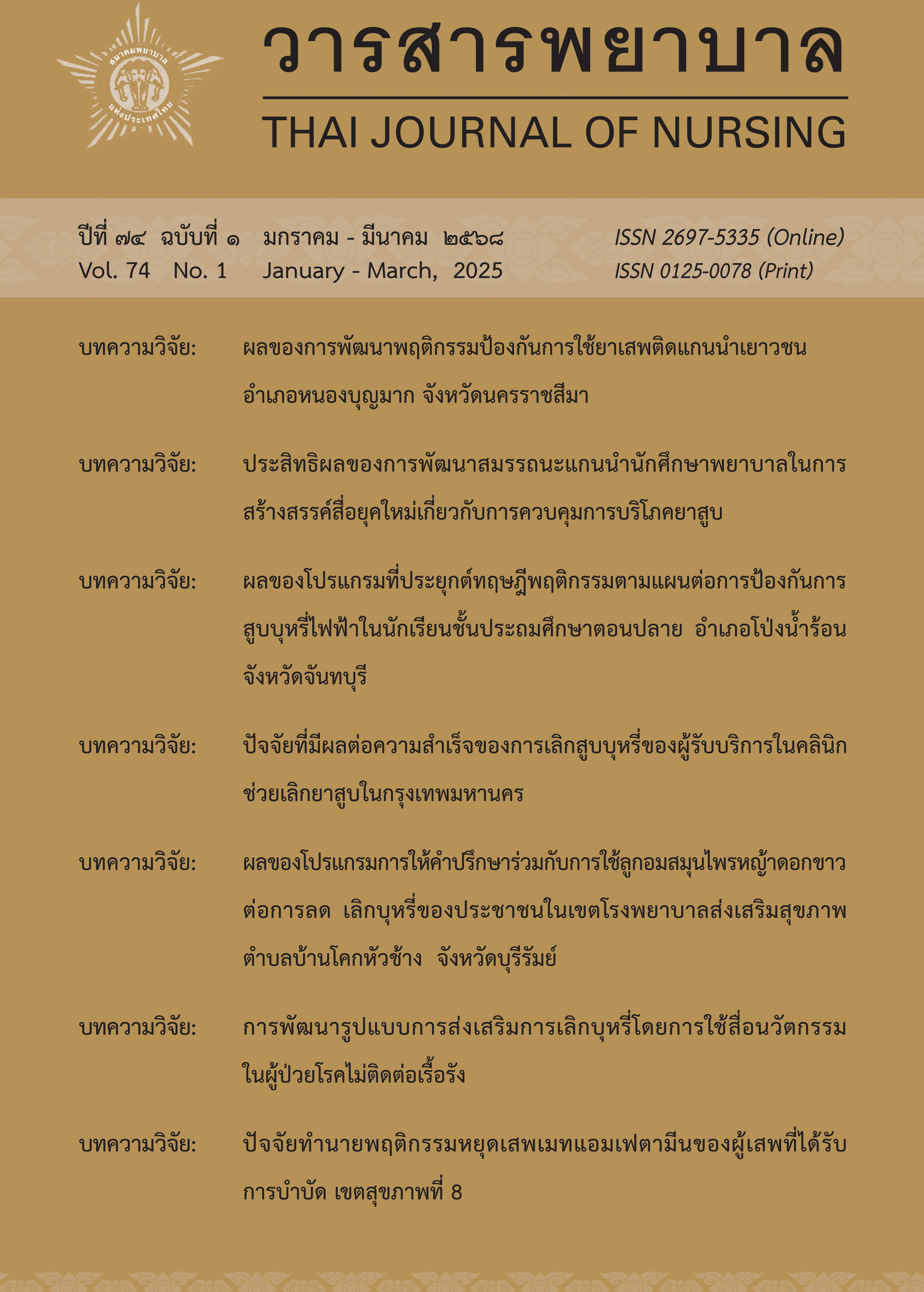Effect of the TPB -based intervention on e-cigarette smoking prevention among elementary school students at Pong Nam Ron District in Chanthaburi Province
Main Article Content
Abstract
The objective of this quasi-experimental study was to examine effect of the TPB -based intervention on e-cigarette smoking prevention among elementary school students at Pong Nam Ron district in Chanthaburi province. Participants were male and female students, 5- 6th grade, 62 students were purpossively selected and equally divided into the experimental group received TPB -Based Intervention consisted of a four-session intervention and 4 weeks follow- up and the comparative group attended regular classes. Data were collected using questionnaires. The two-way repeated -measures ANOVA was used in data analysis. Results reveal that at post-test and follow-up peroids, the experimental group had an average score of anti- smoking attitudes towards e-cigarette, e-cigarette vaping refusal self-efficacy, and intention to denied vaping higher than those at pre-test and the comparative group at p < .001 (F = 30.714, F = 56.531 and F = 126.123, respectively).
Article Details

This work is licensed under a Creative Commons Attribution-NonCommercial-NoDerivatives 4.0 International License.
References
กิตติพงษ์ เรือนเพ็ชร, พรนภา หอมสินธุ์, และ ยุวดี ลีลัคนาวีระ. (2565). ปัจจัยที่มีความสัมพันธ์กับการสูบบุหรี่ไฟฟ้าของนักเรียนชายอาชีวศึกษา จังหวัดบุรีรัมย์. วารสารพยาบาลทหารบก, 23(2), 531-539.
จุไรรัตน์ ช่วงไชยยะ, มณฑา เก่งการพานิช, และ ศรัณญา เบญจกุล. (2564). ผลของโปรแกรมป้องกันการสูบบุหรี่ร่วมกับการใช้ Facebookในนักเรียนมัธยมศึกษาปีที่ 2 อําเภอเมือง จังหวัดประจวบคีรีขันธ์. วารสารสถาบันบำราศนราดูร, 15(2), 94-105.
ธีรพล หล่อประดิษฐ์ และ ณรงค์ศักดิ์ หนูสอน. (2559). ผลของโปรแกรมการป้องกันการสูบบุหรี่ของนักเรียนมัธยมศึกษาตอนต้นโรงเรียนขยายโอกาส อำเภอคีรีมาศ จังหวัดสุโขทัย. The National and International Graduate Research Conference 2016: Graduate school, Khon Kaen University, Thailand and Universitas Muhammodiyah Yogyakarta, Indonesia, 634-644. https://gsbooks.gs.kku.ac.th/59/ingrc2016/pdf/MMO6.pdf
ปริญญา ดาระสุวรรณ์ และ ณัฐกฤตา ศิริโสภณ. (2563). ประสิทธิผลโปรแกรมสุขศึกษาเพื่อส่งเสริมพฤติกรรมป้องกันการบริโภคผลิตภัณฑ์ยาสูบของนักเรียนหญิงระดับชั้นประถมศึกษาในพื้นที่กรุงเทพมหานคร. วารสารพยาบาลทหารบก, 21(2), 74-83.
พัชรินทร์ อัจนากิตติ, ทัศนีย์ รวิวรกุล, สุรินธร กลัมพากร, และ นฤมล เอื้อมณีกูล. (2565). ผลของโปรแกรมป้องกันนักบบุหรี่หน้าใหม่ในนักเรียนอาชีวศึกษา. วารสารพยาบาล, 71(1), 10-19.
“ หมอประกิต ” โต้ปม กม.ห้ามนำเข้า-ขายบุหรี่ไฟฟ้า ด้านสสส.ไม่หนุนสิ่งทำลายสุขภาพ. (2567, มกราคม 24). มูลนิธิรณรงค์เพื่อการไม่สูบบุหรี่. https://www.smokefreezone.or.th/news_page/505/
ศูนย์วิจัยและจัดการความรู้เพื่อการควบคุมยาสูบ. (2566). บุหรี่ไฟฟ้า มหาภัยร้าย ทำลายเยาวชนอนาคตของชาติ. ก้าวทันวิจัยกับ ศจย.,15(1), 4-11. https://www.trc.or.th/th/attachments/ article/741ศจย%20ปี%2015%20ฉบับที่%201-for%20web.pdf
Ajzen, I. (1991). The theory of planned behavior. Organizational Behavior and Human Decision Processes, 50(2), 179-211.
Nurumal, M. S., Zain, S. H. M., Mohamed, M. H. N., & Shorey, S. (2021). Effectiveness of school-based smoking prevention education program (SPEP) among nonsmoking adolescents: A quasi-experimental study. The Journal of School Nursing, 37(5), 333-342.
Patiño-Masó, J., Font-Mayolas, S., Salamó, A., Arboix, M., Sullman, M. J., & Gras, M. E. (2019). Predictors of intentions to use cigarettes and electronic-cigarettes among high school students. Journal of Multidisciplinary Health Care, 12, 591-599.
Putthai, P., Srisuriyawat, R., & Homsin, P. (2023). Effects of social cognitive theory applied program on E-cigarette smoking prevention among junior high school students. Thai Pharmaceutical and Health Science Journal, 18(1), 50-59.
Scheinfeld, E., Crook, B., & Perry, C. L. (2019). Understanding young adults' E-cigarette use through the theory of planned behavior. Health Behavior and Policy Review, 6(2), 115-127.
Sreeramareddy, C. T., Acharya, K., & Manoharan, A. (2022). Electronic cigarettes use and ‘dual use’ among the youth in 75 countries: estimates from Global Youth Tobacco Surveys (2014-2019). Scientific Reports, 12(1), Article 20967. https://www.nature.com/articles/s41598-022-25594-4
Wang, L., Zhang, Q., Cao, M. R., & Wong, P. P. W. (2022). Use and perceptions of electronic cigarettes among young Chinese generation: Expanding the theory of planned behaviour. International Journal of Humanities, Management and Social Science, 5(1), 26-39.
Yang, Q. (2024). Understanding the associations between adolescents’ exposure to e-cigarette information and vaping behavior through the theory of planned behavior. Health Communication, 39(4), 641- 651.


